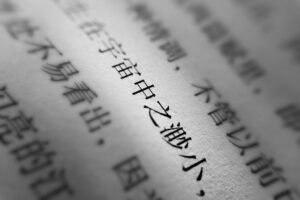The Chinese language, with its intricate system of characters and tones, offers a fascinating glimpse into the world of nuanced expression. One such nuance is encapsulated in the modal particle “得 (děi),” a term integral to expressing necessity or obligation in Mandarin. This article delves into the various dimensions of “得 (děi),” exploring its usage, linguistic significance, and cultural implications.
Table of Contents
ToggleUnderstanding “得 (děi)”
“得 (děi)” is often translated to English as “must” or “have to,” signaling an obligation or necessity. However, this simple translation belies the depth of its application in Chinese. Unlike English, where “must” or “have to” can be used interchangeably in many contexts, “得 (děi)” has a more specific usage.
Usage in Context
As an Expression of Necessity
In its primary use, “得 (děi)” precedes a verb indicating the action is necessary. For example:
- 我得去工作 (Wǒ děi qù gōngzuò) – “I must go to work.”
- 你得学习 (Nǐ děi xuéxí) – “You have to study.”
This structure is straightforward: “得 (děi)” + [Verb].
As a Suggestion or Strong Recommendation
“得 (děi)” can also be used to strongly recommend or advise, often seen in parental or authoritative advice. For instance:
- 你得多休息 (Nǐ děi duō xiūxi) – “You should rest more.”
Linguistic Significance
“得 (děi)” is part of a broader category known as modal particles in Chinese, which modify the mood of a verb. Understanding its use is crucial for mastering the subtleties of Chinese grammar. Its importance comes from its capacity to convey duty without using the English auxiliary verbs “must” or “should.”
Cultural Implications
“得 (děi)” often reflects cultural values, especially the importance of duty and obligation in Chinese society. Its frequent use in everyday language underscores a collective understanding of responsibility, whether in family, work, or social commitments.
Common Mistakes and Confusions
Confusion with “要 (yào)”
Learners often confuse “得 (děi)” with “要 (yào),” another modal particle expressing necessity. The critical difference is that “要 (yào)” often implies a desire or intention, whereas “得 (děi)” is about obligation.
Overuse in Informal Settings
While “得 (děi)” is versatile, overusing it in informal conversations can sound overly formal or authoritative. It’s essential to gauge the context and relationship between speakers.
Conclusion
“得 (děi)” is more than just a word; it’s a window into Chinese thought and culture. Its proper use is essential for anyone seeking a deeper understanding of Mandarin Chinese. As with any language, the nuances of “得 (děi)” can be fully appreciated only through practice and immersion in the rich tapestry of Chinese culture.
Contact our head teacher, Chen Huimin, at info@lcchineseschool.com if you want to learn Chinese or have additional questions about our Chinese programs.
Sign up for a free trial class here.
Learn about our Internship Program in China.
Get free Chinese learning resources.
Learn about China’s 2024 Offical Holiday Schedule







